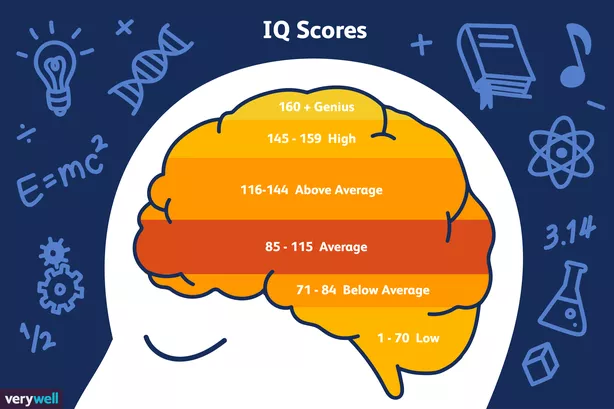
It may surprise you to learn that one of the reasons more people aren’t geniuses is that they think genius has to do with having a high IQ. What if I could show you that wasn’t the case, and that you already have access to genius?
By now we all know that IQ stands for intelligence quotient. It uses tools to supposedly measure intellectual ability and cognitive potential.
It’s also a way to indicate when someone displays higher levels of intelligence.
The test, based upon the Stanford–Binet Intelligence Scales, typically tests in several cognitive areas:
- Language
- Reasoning abilities
- Processing speed
- Visual-spatial processing
- Memory
- Math
IQ typically tests for everything within the rational framework of mental ability. This means that these tests measure one’s strengths and abilities in logic, cognitive ability, critical analysis, reasoning, conceptual thinking, spatial cognition, verbal and nonverbal subtests, quantitative reasoning, visual-spatial processing, working memory, and fluid reasoning.

When someone displays an exceptionally high IQ (intelligence quotient), we label them a genius, even if they haven’t done anything remarkable with it other than score high on a test.
The word genius historically has been associated with the highest of intelligence and intellectual aptitude. Yet according to an article in Psychology Today written by Andrew Robinson, “We find it remarkably hard to define genius.”1 And according to the Encyclopedia of Creativity, “There is no scientifically precise definition of genius.”2 However, it turns out there are specific areas of genius which helps us to identify them.
Not one of these intelligence tests, however, accommodates any way to measure creative or intuitive thinking, which is what so many disruptive “genius” creators use religiously.
And to further illustrate how wide the difference between IQ and genius is, When five of the top-scoring members of Mensa (an exclusive international society open only to people who score at or above the 98th percentile on an IQ or other standardized-intelligence test) were interviewed as to whether they considered themselves genius, they sited reasons like achievement, complexity, giftedness, athletic ability, artistic ability, pushing boundaries, and one’s aptitude to create something new as being the reasons that genius is different from intelligence. None of which, according to them, has to do with an intelligence quotient test.3

At present, there are tests for IQ, personality, emotional intelligence, career aptitude, curiosity, and creativity. Still, there is no test to accurately determine the level of one’s genius or even one’s proclivity towards genius. There are also tests, currently, that label themselves genius tests, but again, those tests measure areas of rational thinking and therefore are primarily for areas of IQ, not genius.
The Stanford-Binet Intelligence Scales (revised from the Binet-Simon Scale by Lewis Terman) focuses primarily on the areas of the rational mind. A higher IQ score means your reasoning and problem-solving abilities are better than average and may signal intellectual potential.
However, IQ alone doesn’t tell the whole story.
Why has there been so much focus and attention on intelligence, and less on intuitive genius, which radical thinkers like Albert Einstein insist is the better thinking style?
What has caused humans to chase rational thinking over intuition? Yes, rational is a great tool for problem-solving, surviving, and navigating societal practices, and it has great value and merit when it comes to math and science, but why are we forgoing intuitive thinking, which, after all, is responsible for most of our growth and evolution?
Historically, every invention that is responsible for how we live, act, and think has been the result of some wildly radical new idea or concept that forced us to think and behave in a completely new way.
Electromagnetism, gasoline, electricity, the lightbulb, automobiles, radio, television, trains, airplanes, and computers, just to name a few of the many spontaneous ideas that were created, and all came from someone’s intuitive mindset, showing us that things should change. And once we adopted their ideas into our lives, they transformed the way we developed and lived.
And then there are those geniuses in the areas of sports, music, the arts, fashion, and design, which have nothing to do with problem-solving or rational thinking, yet we still defer to rational thinking over intuitive thinking as the more important and valuable thinking style.

And while there’s no argument that both rational and intuitive thinking have their place, to quote Einstein, “We have made the sacred gift (intuitive thinking) the slave.” In other words, we’ve placed intuition on the backburner, deeming it as a luxury to be used sparingly.
This is the very reason that geniuses seem so rare and unique. When one breaks from the pack to show us a newer, better way, and that way is exceptional, we marvel and applaud their genius. And because we’ve associated genius with IQ for so long, we think that what these geniuses can accomplish is out of reach for the rest of us. So, we push ourselves towards what society deems to be the better areas of development.
But what if we’ve been wrong this whole time, and it turns out that everyone has access to this same gift of genius?
We know two things to be true. It’s been proven by several reputable sources (Land and Jarmen, Gillford, the Torrance test, Kaufman, the Remote Associations Technique; Mednick, Sir Ken Robinson), that children between the ages of two to ten have a remarkably high aptitude toward creative genius and that later, those gifts start to diminish the more the educational system and society get their hands on these children.
And second, society deems anything remotely related to creative, imaginative, intuitive, divergent, or fanciful areas of thinking, to be used sparingly and are not seen as important or valuable tools.
So how then do we explain musical, athletic, artistic, or even inventive genius? Could it simply be surmised that these geniuses are a result of hours of practice and commitment? If so, don’t Salieri and Mozart have the same levels of commitment and dedication?
What makes them genius, what sets them apart is not found in intelligence, but instead within the word freedom, allowing them to explore unlikely paths of discovery.
There are several areas where freedom has been instilled within these unique and often rare individuals.
- Freedom of thought; they are unconstrained in how they look at the world.
- Freedom in imagination; they are able to envision what they want to do and where they want to go.
- Freedom in failure; they are able to use failure as a gauge between where they are and where they want to be.
- Freedom of ego; their creativity is neither hindered by their ego nor hindered by the egos of others.
- Freedom to play; they are always in a state of wonderment, an adventurous spirit, and the experimental nature of designing and crafting their unique ideas and perspectives into a reality of their own choosing.
Who is it that allowed them these freedoms of thought at such early ages, and how were they able to maintain these marvelous talents well into adulthood?
Children are natural intuitivist. It’s how they learn about the world. Their imaginative, playful, explorative, and adventurous nature offers them an opportunity to learn and discover on their own terms. Their ability to remain curious enables them to pull at their particular thread of wonder to see where it leads them. Some embrace this ability, encouraged by a rare parent or adult who nurtures them to explore what’s out there in the world. Others acquire a curious desire to dig deeper to understand the world, rather than just learn it by rote, and some get a spark of an idea from someone who has shown them the magic the world has to offer.
These distinctive young individuals who learn to discover in their own way, don’t adhere to societal beliefs and limiting conditioning. They see the world as they define it, not how society says it should be. In other words, they have found their own path and are highly motivated to traverse a different way than convention suggests. If you’re a parent, I bet you’ve even experienced your child myopically focused on something he or she is fascinated with, that you have no clue about.
Teachers and authorities will often get either frustrated by this myopic outlook or learn to embrace and encourage their unique perspective.
Now that you are an adult, is it too late for you to reacquire these once natural and powerful attributes?
Good news. It’s never too late. Let’s get you back on track.
This will be a quick overview of how you can start to regain those more powerful areas of thinking. You can learn more as you read more articles I will post or by reading my book, Disruptors.
In the meantime, here are some guidelines you can adopt to begin your journey back to a more powerful, intuitive mindset.
When you read these, they may seem silly, obvious, or impractical. That’s your rational thinking taking over. Allow yourself permission to explore these newer areas of thinking.
1: Wonderment. Get your curious mind charged up again. We’ve been conditioned to look for logic, reasoning, and empirical conclusions on which to base our decisions. For you to regain your intuitive mindset you need to let go of the need to solve a problem or come to a logical conclusion. Instead, explore with no further desire than to see what’s out there. By not drawing conclusions you begin to access and expand your divergent thinking abilities. Ask questions. Don’t be afraid or embarrassed to ask the deeper questions. This will offer you a new set of tools for creating and envisioning on a higher scale.
2: Daydream. Let your mind wander. We have become so ingrained to absorb outside information, that we dampen our ability to imagine. Constant noise is our default standard. We talk on the phone, listen to music, chat, watch TikTok, YouTube, and other sources of social media. With all that outside noise coming at us all the time, it’s a wonder that we don’t know how to imagine. Think of it this way, when everything is coming into your mind from outside sources, how are you able to have a thought of your own, or, more importantly, have the thinking space and freedom to imagine on a bigger scale? By learning to shut out all the outside noises, you encourage your mind to daydream. In this state, your mind is now allowed to explore new and unusual thoughts and ideas.
3: Play. Yup, you heard me right. Play is where creativity comes out to shine. Have you ever heard the phrase ‘sandboxing?’ It’s not used simply to test out a product or concept, it’s used as a safe environment to explore, figure out, and discover. When you are in play mode, you are giving yourself permission to take bigger risks, be sillier in your choices, and just see where things go. Strangely enough, this is how we learn. For example, have you ever played a video game where you have an avatar? You know logically that he or she is not real, so you are willing to take more chances and risk more. In this way, you learn as you go and by risking more, you become a better player. This is what play is good for… taking the bigger chances, not being so outcome-oriented, and just seeing where it takes you. By playing, you give yourself permission to be wrong… or right.
4: Act. In the real world, we don’t want to fail. We also don’t want to look bad, foolish, waste time, or hit too many dead-ends. So instead, what we do is limit ourselves by conditioning our mindset to hesitate and rationalize. By acting, meaning no hesitation, you are giving yourself permission to be wrong. Why is this important? Failure is often the key to discovery. Edison, Faraday, the Wright brothers, Curie, da Vinci, Einstein, and other Disruptors allowed themselves permission to fail and figure out the best road for them. The principle of ACT is simple. Don’t hesitate. Don’t second-guess yourself. Don’t reason or rationalize, just (thanks Nike) do it!
5: Pretend. Isn’t this the same as imagining, playing, daydreaming? Well, they are in the same wheelhouse of intuitive thinking, but pretending is where some of the bigger magic comes into play. When you pretend, you put no constraints on what is possible. You go where there is no obvious path, initially, and you allow your creative ideas to run free. Think about the creations from Xerox Parc. These guys were encouraged to pretend, invent, explore, and imagine wildly ungrounded ideas, that, initially, had no place or purpose (that is, until much later… Apple).
What’s the secret to pretending? It’s one fantastic word adults rarely use. It’s the word fantasize. Here’s a way to look at what fantasy means in the real world. Everything you enjoy, every creation you take for granted, came from someone’s ability to fantasize it. The cellular smartphone you now enjoy was nothing more than fantasy until someone made it a reality. The car you drive, the television you watch, and even the clothes you wear came from someone else’s fantasy of what they wanted them to become. There was a time we couldn’t conceive of flying in a tin can to another part of the world, let alone having food while doing so. There are even those fantasies we take for granted, ovens, microwaves, automated doors, washing machines, and even refrigerators. All once considered fantasy. Fantasy is permission to create on a bigger scale.
Initially, you will ponder and consider the value of these ideas I’ve shown you here today. That’s okay. That’s just your rational mind trying to take over again because it’s always been in charge. But I promise if you allow yourself permission and the egolessness to think about incorporating these ideas into your repertoire, I guarantee that a) no one will judge you, and b) you’ll see yourself gaining new freedoms and abilities you’ve never had before. Consider this the new renaissance to come. Enjoy!
Footnotes:
1: Can We Define Genius? Robinson, Andrew, Psychology Today, Sussex Publishers, LLC. Retrieved November 30, 2010
2: Encyclopedia of Creativity Invention Innovation and Entrepreneurship, Section on “Genius”, Aleinikov,Andrei G., International Academy of Genius, Monterey, CA, USA, pg. 1046
3: https://nautil.us/how-is-a-genius-different-from-a-really-smart-person-2527/